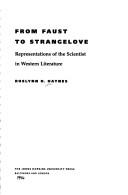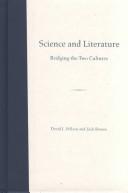| Listing 1 - 10 of 200 | << page >> |
Sort by
|
Book
ISBN: 1283165279 9786613165275 3110229161 9783110229165 9783110229158 3110229153 9781283165273 6613165271 Year: 2010 Publisher: Berlin : De Gruyter,
Abstract | Keywords | Export | Availability | Bookmark
 Loading...
Loading...Choose an application
- Reference Manager
- EndNote
- RefWorks (Direct export to RefWorks)
Vor dem Hintergrund der im 18. Jahrhundert erstmals manifest werdenden funktionalen Ausdifferenzierung der modernen Gesellschaft wird das Verhältnis zwischen Literatur und Wissenschaft an Beispielen aus dem französischen (Diderot, Rousseau, Balzac, Flaubert, Zola, Proust, Houellebecq), deutschsprachigen (Goethe, Freud, Musil), italienischen (Vico, Manzoni, Pirandello, Svevo, Calvino, Del Giudice) und spanischsprachigen Bereich (Pío Baroja, Borges, Cortázar, Volpi) untersucht. Dabei zeigt sich, dass es trotz der zunehmenden Trennung der Bereiche (die C. P. Snow auf die Formel der ,zwei Kulturen' gebracht hat) immer wieder zu poetologisch und epistemologisch aufschlussreichen Interferenzen von Literatur und Wissenschaft kommt. Während im 18. Jahrhundert literarische Texte noch einen Platz in der offiziellen Wissensordnung hatten, wächst im 19. Jahrhundert das Bewusstsein für die grundlegende Differenz der Bereiche. Aufgrund der Dominanz der Naturwissenschaften und des Positivismus versuchen literarische Texte seit Balzac sich durch die poetologische Funktionalisierung (natur-)wissenschaftlicher Modelle zu legitimieren. Im 20. Jahrhundert werden in der teilweise skeptischen Auseinandersetzung mit wissenschaftlichen Modellen die Grenzen der Literatur ausgelotet.
Literature and science. --- Poetry and science --- Science and literature --- Science and poetry --- Science and the humanities

ISBN: 0801848016 Year: 1994 Publisher: Baltimore Johns Hopkins University Press
Abstract | Keywords | Export | Availability | Bookmark
 Loading...
Loading...Choose an application
- Reference Manager
- EndNote
- RefWorks (Direct export to RefWorks)
Literature and science --- Scientists in literature --- Poetry and science --- Science and literature --- Science and poetry --- Science and the humanities
Book
ISBN: 128343654X 1443835463 9786613436542 9781443835466 9781283436540 9781443835190 1443835196 Year: 2012 Publisher: Newcastle upon Tyne Cambridge Scholars Pub.
Abstract | Keywords | Export | Availability | Bookmark
 Loading...
Loading...Choose an application
- Reference Manager
- EndNote
- RefWorks (Direct export to RefWorks)
Since its origin, American literature has always had an uneasy relationship with science: born at a time when science was becoming a profession, it repeatedly referred to it, implicitly or explicitly, in order to assert its difference or, on the contrary, to gain a certain form of legitimacy. The purpose of this book is to show how scientific discourse informs literary writing, and to consider the relationship the two types of discourse have maintained: mutual metaphorization, questioning or ...
Literature and science --- Poetry and science --- Science and literature --- Science and poetry --- Science and the humanities --- History

ISBN: 9780813022833 0813022835 Year: 2001 Publisher: Gainesville, Fla University Press of Florida
Abstract | Keywords | Export | Availability | Bookmark
 Loading...
Loading...Choose an application
- Reference Manager
- EndNote
- RefWorks (Direct export to RefWorks)
Literature and science --- Poetry and science --- Science and literature --- Science and poetry --- Science and the humanities --- Science --- Thematology
Book
ISBN: 1443876054 9781443876056 1443812730 9781443812733 Year: 2017 Publisher: Newcastle upon Tyne, UK
Abstract | Keywords | Export | Availability | Bookmark
 Loading...
Loading...Choose an application
- Reference Manager
- EndNote
- RefWorks (Direct export to RefWorks)
This collection of essays responds to the intense interest that the relations between the discourses of literature (and other cultural practices) and those of science have obtained throughout various fields of study. Spanning a period between the mid-nineteenth century and the twenty-first century, the work collected here is firmly focused on the cultural significance of scientific discoveries and practices, and especially on the manifold representations of science and scientists in literature and the arts. Its four sections develop from an initial moment of dwindling indefiniteness of borders between literature and the sciences to the historical perception of an increasing divide between "the two cultures," to use C.P. Snow's influential expression, as well as calls for a form of convergence or "consilience" in Edward Wilson's words. The final section turns to the medical sciences, a porous scientific discipline in relation to the humanities, which suggests that consilience can already be found partially in specific areas. As such, this collection contributes towards critically extending that integration through the discussion of key literary representations of science, its promises, and its problems.
Literature and science --- Poetry and science --- Science and literature --- Science and poetry --- Science and the humanities --- History
Book
ISBN: 9781107079724 9781139942096 9781107439030 Year: 2018 Publisher: Cambridge : CamBridge University Press,
Abstract | Keywords | Export | Availability | Bookmark
 Loading...
Loading...Choose an application
- Reference Manager
- EndNote
- RefWorks (Direct export to RefWorks)
Literature and science --- Poetry and science --- Science and literature --- Science and poetry --- Science and the humanities --- History --- History.
Book
ISBN: 1009263501 1009263528 1009263536 1009263552 Year: 2023 Publisher: Cambridge ; New York, NY : Cambridge University Press,
Abstract | Keywords | Export | Availability | Bookmark
 Loading...
Loading...Choose an application
- Reference Manager
- EndNote
- RefWorks (Direct export to RefWorks)
Literature, Science, and Public Policy shows how literature can influence public policy concerning scientific controversies in genetics and other areas. Literature brings unique insights to issues involving cloning, GMOs, gene editing, and more by dramatizing their full human complexity. Literature's value for public policy is demonstrated by striking examples that range from the literary response to evolution in the Victorian era through the modern synthesis of evolution and genetics in the mid-twentieth century to present-day genomics. Outlining practical steps for humanists who want to help shape public policy, this book offers vivid readings of novels by H. G. Wells, H. Rider Haggard, Aldous Huxley, Robert Heinlein, Octavia Butler, Samuel R. Delany, David Mitchell, Margaret Atwood, Ian McEwan, Kazuo Ishiguro, Gary Shteyngart, and others that illustrate the important insights that literary studies can bring to debates about science and society. This title is also available as Open Access on Cambridge Core.
Dissertation
ISBN: 908032194X Year: 2004 Publisher: Den Haag Talkingtree
Abstract | Keywords | Export | Availability | Bookmark
 Loading...
Loading...Choose an application
- Reference Manager
- EndNote
- RefWorks (Direct export to RefWorks)
Theses --- Literature and science --- Poetry and science --- Science and literature --- Science and poetry --- Science and the humanities --- History --- Winterson, Jeanette, --- ווינטרסון, ג׳נט, --- Criticism and interpretation.
Book
ISBN: 9783110323948 9783110324358 3110324350 311032394X 9783110324341 9783110382198 3110324342 3110324350 3110382199 Year: 2015 Volume: 1 Publisher: Berlin Boston
Abstract | Keywords | Export | Availability | Bookmark
 Loading...
Loading...Choose an application
- Reference Manager
- EndNote
- RefWorks (Direct export to RefWorks)
One of the most contentious questions in contemporary literary studies is whether there can ever be a science of literature that can lay claim to objectivity and universality, for example by concentrating on philological criticism, by appealing to cognitive science, or by exposing the underlying media of literary communication. The present collection of essays seeks to open up this discussion by posing the question's historical and systematic double: has there been a science of literature, i.e. a mode of presentation and practice of reference in science that owes its coherence to the discourse of literature? Detailed analyses of scientific, literary and philosophical texts show that from the late 18th to the late 19th century science and literature were bound to one another through an intricate web of mutual dependence and distinct yet incalculable difference. The Science of Literature suggests that this legacy continues to shape the relation between literary and scientific discourses inside and outside of academia.
Literature and science --- German literature --- Young Germany --- Poetry and science --- Science and literature --- Science and poetry --- Science and the humanities --- History and criticism. --- Literature. --- history. --- science. --- technology.
Book
ISBN: 3110665832 3110665964 3110665824 Year: 2020 Publisher: De Gruyter
Abstract | Keywords | Export | Availability | Bookmark
 Loading...
Loading...Choose an application
- Reference Manager
- EndNote
- RefWorks (Direct export to RefWorks)
Par la puissance métaphorique et la force de modélisation qu'ils revêtent, les savoirs biologiques et leurs représentations suscitent au XIXe siècle la fascination des écrivains. Ceux-ci y trouvent la source d'une nouvelle poésie, d'un imaginaire dépassant la logique positiviste, mais aussi des formes textuelles nouvelles, une poétique, voire une esthétique permettant de redéfinir l'idée du « beau ». Le présent volume étudie l'impact des savoirs biologiques sur la création littéraire du XIXe siècle, en se donnant trois objectifs : (1) étudier la diffusion et la réception des savoirs biologiques par les écrivains du XIXe siècle, en prêtant une attention particulière aux travaux étrangers majeurs en la matière ; (2) analyser l'usage et les fonctions des savoirs biologiques dans les textes littéraires, leurs transformations sur le plan du contenu, de l'écriture et de la poétique, ce qui présuppose aussi l'identification des enjeux idéologiques de ces savoirs ; (3) penser les rapports ou les décalages entre l'histoire des sciences et l'histoire de la littérature, qui tantôt rend compte de débats d'actualité, tantôt au contraire s'inscrit dans des savoirs plus anciens.
Literary studies: from c 1900 --- -Literary studies: fiction, novelists & prose writers --- Science: general issues --- Balzac. --- Darwin. --- Flaubert. --- Science and literature. --- 1800-1899
| Listing 1 - 10 of 200 | << page >> |
Sort by
|

 Search
Search Feedback
Feedback About UniCat
About UniCat  Help
Help News
News